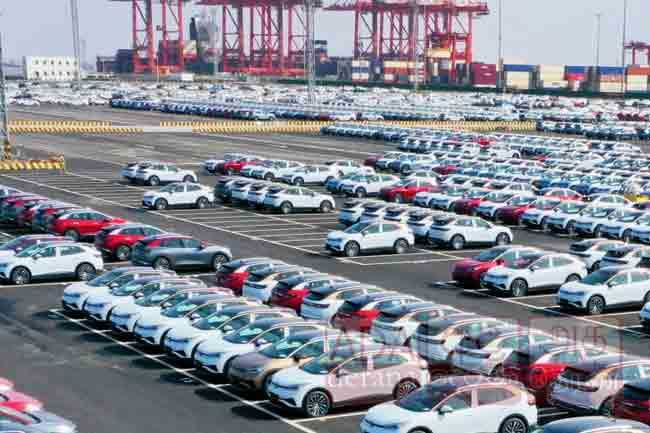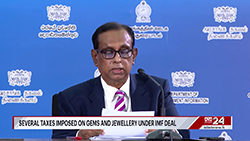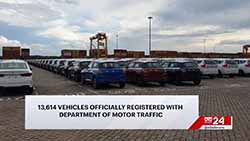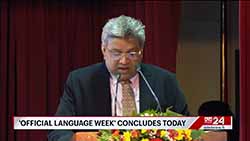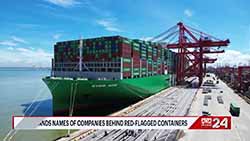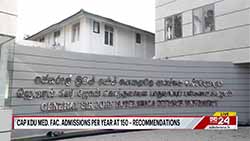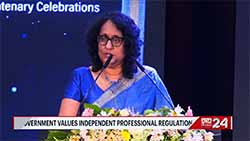No decision has been made to restrict vehicle imports -CBSL
July 7, 2025 07:30 pm
No decision has been made to restrict vehicle imports, the Central Bank of Sri Lanka (CBSL) has emphasised.
A senior official of the Central Bank stated that, contrary to certain media reports, there has been no exchange of letters or communication between the Central Bank and the Treasury regarding the restriction of vehicle imports.
With the country’s economy, which was in a crisis, beginning to recover, the import of vehicles for private use was allowed as of the beginning of February this year, after a lapse of five years.
Since then, up until the end of June, approximately 18,000 vehicles have been imported to the country. Of this, 13,614 vehicles have been registered with the Department of Motor Traffic.
Accordingly, in the five months since February, letters of credit worth approximately USD 800 million have been opened for vehicle imports, and so far, vehicles worth USD 450 million have been imported.
Against this backdrop, certain media outlets had reported that the Central Bank and the Treasury had issued warning notices to restrict vehicle imports.
When inquired by Ada Derana, a senior official from the Central Bank stated that there had been no communication or exchange of letters between the Treasury and the Central Bank regarding vehicle imports.
Furthermore, the senior official clarified that no instructions or recommendations to restrict vehicle imports had been given by the Central Bank to the Treasury.
The official further added that the importation of vehicles does not affect the foreign reserves of the Central Bank, as vehicle imports are made from the dollar reserves available in the country’s commercial banking system.
Currently, the Central Bank holds foreign reserves worth USD 6.3 billion. Economic analysts have pointed out that vehicle imports do not have any impact on the Central Bank’s dollar reserves.
Meanwhile, Ada Derana also made inquiries into the market value of the imported vehicles.
Accordingly, a Suzuki Wagon R FX-S, priced at Rs. 3.6 million in Japan, incurs a duty of Rs. 3.8 million when imported to Sri Lanka. Therefore, the total cost of importing the Wagon R comes to around Rs. 7.4 million, but it is sold in the open market for approximately Rs. 8.6 million.
A Toyota Raize 1200cc Hybrid, which costs around Rs. 7.4 million in Japan, incurs a duty of Rs. 6.4 million when imported. Accordingly, the price of importing the Toyota Raize to Sri Lanka is about Rs. 13.8 million, but it is sold in the local market for around Rs. 16.5 million.
A Honda VEZEL X model costs Rs. 8.8 million in Japan, while an import duty of Rs. 9 million is levied for each vehicle. Therefore, the price of importing the VEZEL X is around Rs. 17.8 million, but it is sold in Sri Lanka for approximately Rs. 21 million.
A Toyota Hilux GR Sport model from Thailand costs Rs. 15 million, and when imported to Sri Lanka, a duty of Rs. 13 million is levied. After the duty, the price of importing the Toyota Hilux is approximately Rs. 28.5 million, but it is sold for around Rs. 32 million.
A Toyota Yaris Cross from Japan, worth around Rs. 6.5 million, incurs a duty of Rs. 8.9 million when imported. The total cost of importing the Yaris Cross comes to around Rs. 15.4 million, but it is sold in Sri Lanka for about Rs. 19.5 million.
The Toyota Land Cruiser Prado 250, valued at Rs. 18 million in its country of manufacture, incurs a duty of Rs. 40 million when imported to Sri Lanka. Consequently, the cost of importing the Prado 250 is around Rs. 58.5 million, but it is sold for approximately Rs. 65 million.
Meanwhile, reports indicate that some vehicle importers, in violation of existing import regulations and laws, have kept around 300 vehicles at the Hambantota Port. The Ministry of Finance is expected to discuss further actions regarding these vehicles with Sri Lanka Customs and arrive at a decision.



